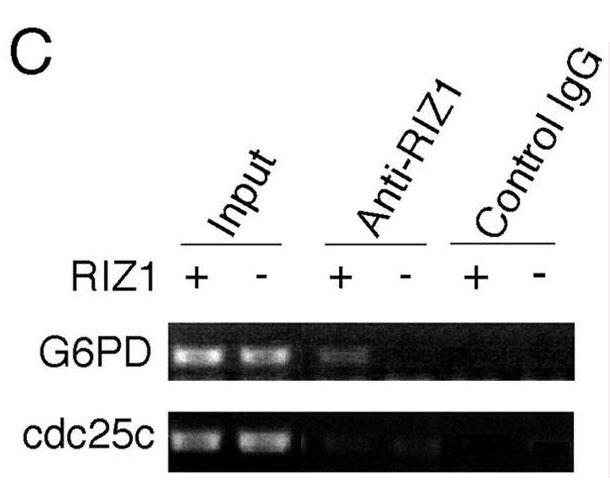PRDM2 (RIZ1) Antibody
Purified Mouse Monoclonal Antibody (Mab)
- SPECIFICATION
- CITATIONS: 2
- PROTOCOLS
- BACKGROUND

Application
| CHIP, WB, E |
|---|---|
| Primary Accession | Q13029 |
| Reactivity | Human, Mouse |
| Host | Mouse |
| Clonality | Monoclonal |
| Isotype | Mouse IgG1 |
| Clone/Animal Names | 33AT1045 |
| Calculated MW | 188915 Da |
| Antigen Region | 1-347 aa |
| Gene ID | 7799 |
|---|---|
| Other Names | PR domain zinc finger protein 2, GATA-3-binding protein G3B, Lysine N-methyltransferase 8, MTB-ZF, MTE-binding protein, PR domain-containing protein 2, Retinoblastoma protein-interacting zinc finger protein, Zinc finger protein RIZ, PRDM2, KMT8, RIZ |
| Target/Specificity | Purified recombinant GST fusion protein encoding aa 1-347 of human RIZ1. This antibody is specific for RIZ1, it does not recognize the isoform beta (RIZ2). |
| Dilution | CHIP~~1:100 WB~~1:1000 |
| Format | Purified polyclonal antibody supplied in PBS with 0.09% (W/V) sodium azide. This antibody is purified through a protein G column, followed by dialysis against PBS. |
| Storage | Maintain refrigerated at 2-8°C for up to 2 weeks. For long term storage store at -20°C in small aliquots to prevent freeze-thaw cycles. |
| Precautions | PRDM2 (RIZ1) Antibody is for research use only and not for use in diagnostic or therapeutic procedures. |
| Name | PRDM2 |
|---|---|
| Synonyms | KMT8, RIZ |
| Function | S-adenosyl-L-methionine-dependent histone methyltransferase that specifically methylates 'Lys-9' of histone H3. May function as a DNA-binding transcription factor. Binds to the macrophage-specific TPA- responsive element (MTE) of the HMOX1 (heme oxygenase 1) gene and may act as a transcriptional activator of this gene. |
| Cellular Location | Nucleus |
| Tissue Location | Highly expressed in retinoblastoma cell lines and in brain tumors. Also expressed in a number of other cell lines and in brain, heart, skeletal muscle, liver and spleen. Isoform 1 is expressed in testis at much higher level than isoform 3 |

Provided below are standard protocols that you may find useful for product applications.
Background
This tumor suppressor gene is a member of a nuclear histone/protein methyltransferase superfamily. It encodes a zinc finger protein that can bind to retinoblastoma protein, estrogen receptor, and the TPA-responsive element (MTE) of the heme-oxygenase-1 gene. Although the functions of this protein have not been fully characterized, it may (1) play a role in transcriptional regulation during neuronal differentiation and pathogenesis of retinoblastoma, (2) act as a transcriptional activator of the heme-oxygenase-1 gene, and (3) be a specific effector of estrogen action. Multiple transcript variants encoding different isoforms have been found for this gene.
References
Genotypes and haplotypes of the estrogen receptor genes, but not the retinoblastoma-interacting zinc finger protein 1 gene, are associated with osteoporosis. HarslÞf T, et al. Calcif Tissue Int, 2010 Jul. PMID 20508921.
DNA methylation of the RIZ1 tumor suppressor gene plays an important role in the tumorigenesis of cervical cancer. Cheng HY, et al. Eur J Med Res, 2010 Jan 29. PMID 20159667.
Genetic variants of methyl metabolizing enzymes and epigenetic regulators: associations with promoter CpG island hypermethylation in colorectal cancer. de Vogel S, et al. Cancer Epidemiol Biomarkers Prev, 2009 Nov. PMID 19843671.
Expression of RIZ1 protein (Retinoblastoma-interacting zinc-finger protein 1) in prostate cancer epithelial cells changes with cancer grade progression and is modulated in vitro by DHT and E2. Rossi V, et al. J Cell Physiol, 2009 Dec. PMID 19746436.
RIZ1 is potential CML tumor suppressor that is down-regulated during disease progression. Lakshmikuttyamma A, et al. J Hematol Oncol, 2009 Jul 14. PMID 19602237.
If you have used an Abcepta product and would like to share how it has performed, please click on the "Submit Review" button and provide the requested information. Our staff will examine and post your review and contact you if needed.
If you have any additional inquiries please email technical services at tech@abcepta.com.














 Foundational characteristics of cancer include proliferation, angiogenesis, migration, evasion of apoptosis, and cellular immortality. Find key markers for these cellular processes and antibodies to detect them.
Foundational characteristics of cancer include proliferation, angiogenesis, migration, evasion of apoptosis, and cellular immortality. Find key markers for these cellular processes and antibodies to detect them. The SUMOplot™ Analysis Program predicts and scores sumoylation sites in your protein. SUMOylation is a post-translational modification involved in various cellular processes, such as nuclear-cytosolic transport, transcriptional regulation, apoptosis, protein stability, response to stress, and progression through the cell cycle.
The SUMOplot™ Analysis Program predicts and scores sumoylation sites in your protein. SUMOylation is a post-translational modification involved in various cellular processes, such as nuclear-cytosolic transport, transcriptional regulation, apoptosis, protein stability, response to stress, and progression through the cell cycle. The Autophagy Receptor Motif Plotter predicts and scores autophagy receptor binding sites in your protein. Identifying proteins connected to this pathway is critical to understanding the role of autophagy in physiological as well as pathological processes such as development, differentiation, neurodegenerative diseases, stress, infection, and cancer.
The Autophagy Receptor Motif Plotter predicts and scores autophagy receptor binding sites in your protein. Identifying proteins connected to this pathway is critical to understanding the role of autophagy in physiological as well as pathological processes such as development, differentiation, neurodegenerative diseases, stress, infection, and cancer.




